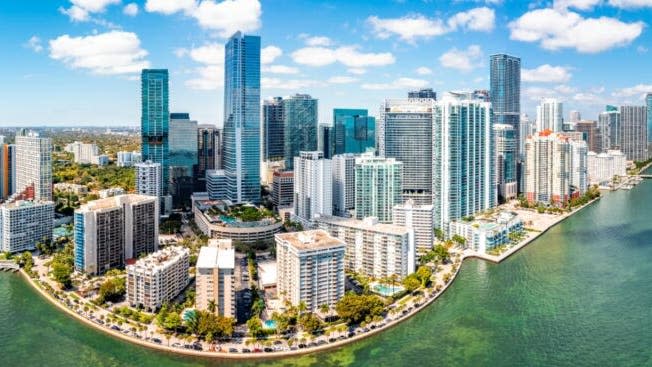The Poison Pill Facing Florida Condo Owners

Imagine being a property owner in a condominium who is humming along paying the mortgage and then getting a letter from your homeowner's association (HOA) informing you of a six-figure assessment. Now imagine that you don't have the money, but under the HOA rules, failing to pay the assessment means losing your unit via foreclosure. However, selling the unit will be nearly impossible once you disclose the assessment to potential buyers. What do you do?
This is the poison pill facing an increasing number of Florida condominium owners. The insurance crisis has gotten most of the attention as the ravages of extreme weather make their presence felt in the Sunshine State with increasing power and frequency. However, one particularly thorny offshoot of the insurance crisis leaves many Florida condo owners with an impossible choice.
Don't Miss:
If there was a new fund backed by Jeff Bezos offering a 7-9% target yield with monthly dividends would you invest in it?
Elon Musk has reportedly bought 6,000 acres of land just outside of this city. Here’s how to invest in its growth before he floods it with new tech workers.
Increased insurance premiums have already left many Florida condo owners facing increased HOA fees. That's coming at a time when the insurance the owners carry on their own units is becoming progressively more expensive. Seventy-nine-year-old Howard Konetz is a condominium owner in Aventura, Florida, living out this nightmare. In a recent interview with Jeffrey Weinsier, an investigative reporter for Local 10 news, Konetz said his condo fees have jumped from $1,500 to $3,000.
Then he was hit with an assessment of $224,000. Condominium owners share ownership of the common areas in their communities and are therefore subject to assessments, which are their share of common area repair costs. Florida condo owners are being hit with these sky-high assessments for several reasons. Many insurers are demanding extensive repairs or upgrades to common areas as a condition of renewing the community's HOA policy.
Another cause for the high assessments traces back to the tragic collapse of the Champlain Towers in Surfside. One of the main causes of the collapse was that important maintenance went years without being done because successive HOA boards couldn't reach a consensus on the cost or timing. After several decades, the issues became so pronounced that they caused the building to collapse.
Trending: Elon Musk and Jeff Bezos are bullish on one city that could dethrone New York and become the new financial capital of the US.
As a result, Florida's legislature passed a law in 2021 requiring HOAs to increase their reserve funds and institute a more frequent inspection regime at all Florida condominiums. Those inspections by municipal authorities and insurance company representatives have led to a laundry list of items that need to be corrected, especially in Florida's older condominium communities.
Unfortunately, many condominium owners in older communities aren't in a financial position to afford the resulting assessments. That's because many of them are older and on fixed incomes. Many of the younger owners chose to buy in older condo communities specifically because they were older and less expensive than the newer communities.
It's also important to note that assessments can vary by unit size. Larger units may have extra parking, storage, or a greater percentage of ownership in the condominium’s common areas. That means they are subject to even larger assessments. Local 10 News reports that some owners in Konetz's Mediterranean Village community have been hit with assessments as high as $400,000.
The plans for Mediterranean Village include elevator repairs, concrete restoration, improvements to the roof, and even $700,000 for landscaping. Konetz and his fellow owners are prevented from passing the costs to potential buyers. Even if they could, no sensible buyer would pay top dollar for a unit with a six-figure assessment due. At a minimum, they will want an equivalent discount on the purchase price. That could leave many sellers upside down.
Konetz has listed his condominium, which still sits on the market after several price drops. An increasing number of for-sale listings on condos show six-figure assessments due, and buyers are staying away. Meanwhile, Konetz is unsure of what the future holds. When Local 10's Jeffrey Weinsier asked him what he planned to do, Konetz had a one-word reply, "Pray."
Keep Reading:
This real estate fund backed by Uber CEO Dara Khosrowshahi gives you instant access to a portfolio of rental properties, and you only need $100 to get started.
This Jeff Bezos-backed startup will allow you to become a landlord in just 10 minutes, and you only need $100.
"ACTIVE INVESTORS' SECRET WEAPON" Supercharge Your Stock Market Game with the #1 "news & everything else" trading tool: Benzinga Pro - Click here to start Your 14-Day Trial Now!
Get the latest stock analysis from Benzinga?
This article The Poison Pill Facing Florida Condo Owners originally appeared on Benzinga.com
© 2024 Benzinga.com. Benzinga does not provide investment advice. All rights reserved.

 Yahoo Finance
Yahoo Finance 